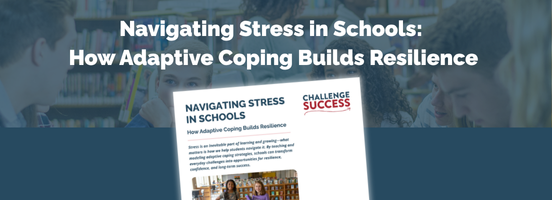When some parents and students refer to March Madness, they aren’t necessarily talking about basketball. They are referring to this particularly stressful time of year when college admission decisions arrive via email and snail mail. I’ve spent a good part of the year traveling to schools around the country, and I know from these discussions that our collective obsession with the college process is not necessarily improving. At times I feel disheartened by the stories I hear — about the anxiety and burden related to college that hold families and educators captive throughout high school. Indeed, in this atmosphere it seems difficult for well-meaning, rational people to find some perspective. And although people nod their heads in agreement when presented with research that demonstrates the positive and successful outcomes for kids who attend all kinds of colleges (not just the elite universities), these folks don’t seem to change their behaviors in light of the data. It seems that the sole purpose of high school has become the four years that happen afterward. Lost is the engagement with learning, the ability to have any unscheduled, non-resume building time, and the 8 to 9 hours of sleep that kids truly need.
I have found that many parents hold on to stereotypes from when they were teenagers as to which schools were considered “good” or “not so good.” These stereotypes were probably never completely accurate, but now, 20 to 30 years later, they are truly obsolete. We are not driving the same cars that we drove 25 years ago, we are not talking on the same phones as we had then, so why in the world would we assume that colleges have not changed since we were applying? I admit that it was hard even for me to give up some of my previous (mis)conceptions about certain colleges, but a recent college visit trip with my daughter shattered any vestiges of doubt that remained. We were literally blown away by the “lesser known” schools that demonstrated incredible advances in their teaching methods, their programming, and their campuses. It is simply not true that only the brand-name institutions will provide the best education, resources, and future success for our kids.
Unfortunately, parents are passing on these misconceptions to their young children. A few months ago, I was speaking at a K-8 school in Northern California where a middle school student asked me a question about college. He had recently been on the Stanford campus and explained that it was definitely going to be his first choice when he applied to college in 5 years. He told me that he “loved the tall trees, the beautiful buildings, and that the college students seemed really happy and smart.” I told him that he was in luck — and then I let him in on an apparent secret — these attributes could be found at thousands of campuses throughout the country!
The reality is that admission directors at highly selective colleges across the country — including Stanford — have acknowledged that almost 75% of their applicants would be terrific students at their universities, but they can only take a much smaller percentage. So what happens to the 70% or so of the smart, motivated, dedicated students who are denied admission to these schools? You’ll find them at a broad range of other colleges: private, public, big, and small. Similarly, what happens to the brilliant Ph.D. students who learn that there are too few openings for new professors at the Ivy League schools? They go on to be brilliant professors at a wide range of other universities. So of course it makes sense that you can find engaging and high-level, intellectual discussion, excellent teaching, and outstanding professional networks at universities all around the country. We have over 2400 four-year colleges in the United States, and at least another 2000 two-year colleges. Our kids deserve to know the truth about the full range of post-secondary options available to them.
For more evidence for all that I have said here, I encourage you to read Frank Bruni’s book: Where You Go is Not Who You’ll Be: An Antidote to the College Admissions Mania. A few weeks ago, I had the pleasure of sharing the stage with this New York Times columnist, and we both tried hard to debunk current college admission myths and encourage families to learn more about schools they might never have considered. You can watch a recording of the event here.
Enjoy your search!
Denise Pope, Ph.D., is a Co-Founder of Challenge Success and a Senior Lecturer at the Stanford University Graduate School of Education, where she specializes in student engagement, curriculum studies, qualitative research methods, and service learning. She is the author of, “Doing School”: How We Are Creating a Generation of Stressed Out, Materialistic, and Miseducated Students, and co-author of Overloaded and Underprepared: Strategies for Stronger Schools and Healthy, Successful Kids. Dr. Pope lectures nationally on parenting techniques and pedagogical strategies to increase student health, engagement with learning, and integrity. She is a 3-time recipient of the Stanford University School of Education Outstanding Teacher and Mentor Award and was honored with the 2012 Education Professor of the Year “Educators’ Voice Award” from the Academy of Education Arts and Sciences.
